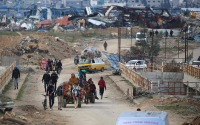Common Dreams / Published on Sunday, February 6, 2005 by the Independent (UK)James C Moore
War is only a cowardly escape from the problems of peace. - Thomas Mann (1875-1955)
President Bush's rhetorical flourishes against tyranny, both in his state of the union speech and his inaugural address, have left Britain, the rest of the EU and much of America wondering if Iran will be the next target of US military might. The consternation is great, and not without cause. Under the Bush administration, a pathology has emerged for asserting foreign policy, and each step foreshadows the next: the President expounds vague principles to stir American hearts and, subsequently, lower administration officials mumble the frightening details. That's the way the US ended up occupying Iraq, and it is how any move will be made against Iran.
The President's thinking on Iran is readily discernible. A few hours before Bush's inauguration, Vice-President Dick Cheney said on a radio talk show that "Iran is at the top of the list" of trouble spots because of "a fairly robust nuclear programme". A similar public pronouncement about Iraq by Cheney proved to be unfounded, but had, nonetheless, the political effect of generating public support for invasion. The day after his state of the union speech, President Bush repeated his conviction that Iran was "the world's primary state sponsor of terrorism". The White House ought to have diminished credibility on such allegations after Iraq, but the American public continues, disturbingly, to listen and trust.
Is the information about Iran any better than it was about Iraq? There is no incontrovertible evidence - for public consumption - that Iran has nuclear capabilities. There are reports, however, and they come from eerily similar sources to those that led the US into Iraq. The National Council of Resistance of Iran, a group of exiles who want to overthrow the ruling clerics, said in Paris last week that Iran had conducted experiments with a nuclear weapon triggering mechanism. The Iraqi National Congress, CIA-funded Iraqi exiles who wanted the US to depose Saddam Hussein, used the same tactic when articulating Saddam's alleged nuclear indiscretions.
The safest assumption is that Bush believes Iran is acquiring nuclear capability. No one need be an expert at diplomacy to reach an unsettling conclusion on how Bush intends to deal with Iran. At the end of a lengthy interview with the conservative Washington Times, the President asked the assembled reporters if they had read Nathan Sharansky's book The Case for Democracy. A former Soviet refusenik and an Israeli cabinet member, the right-wing Sharansky has been criticised for promoting the destruction of non-democratic regimes and avoiding appeasement.
"If you want a glimpse of how I think about foreign policy, read Nathan Sharansky's book," the President urged his interviewers. "It will help explain a lot of the decisions that you'll see being made, you've seen made and will continue to see made."
But democracy by destruction will not be simple in Iran. The 150,000 US troops occupying Iraq are already fully engaged. An alternative plan will have to be devised, and, undoubtedly, it already has been. Guided by Karl Rove, nothing in the Bush administration happens by accident. Thus, Cheney's radio interview was calculated to deliver threats to Iranian mullahs. "Given the fact that Iran has a stated policy that their objective is the destruction of Israel," Cheney explained, "the Israelis might well decide to act first and let the rest of the world worry about cleaning up the diplomatic mess afterwards."
Indeed, there is a body of evidence that indicates trouble is already afoot. Investigative journalist Seymour Hersh has reported in The New Yorker that the US has been running special operations forces into Iran to identify potential targets. Given the close alliance between the Bush White House and Israeli Prime Minister Ariel Sharon, the intelligence is almost certain to be shared; the next decision will be who, if anyone, shoots at the Iranian targets.
Israel's attack jets cannot reach Iran without flying through Iraqi airspace, which would make the US complicit in an Israeli air strike against Iranian nuclear facilities. But The Los Angeles Times reported a year ago that Israel had taken delivery of three Dolphin-class submarines from Germany. American and Israeli defence sources confirmed the subs had been modified to be armed with US-made Harpoon missiles; military analysts have speculated at least one of the vessels is on patrol within range of Iran.
Words might work to chasten Iran's nuclear ambitions, but the US and Israel have stopped pointing fingers at Iran, and have begun to point guns. The White House has been steered by thinkers such as William Kristol, chairman of the Project for the New American Century, which created the neo-conservative movement calling for the US to exercise force to create democracies. Kristol does not believe President Bush has much choice when it comes to Iran. "I don't think George W Bush thinks he got re-elected to preside over the theocratic regime getting nuclear weapons," he said recently.
Israel, too, is a nation founded on religious conviction and its policy of nuclear ambiguity, sanctioned by the US, continues to aggravate Islamic countries. Israel is not a signatory of the non-proliferation treaty and has never formally acknowledged a nuclear programme. The consensus, however, is that Israel has as many as 200 sophisticated nuclear weapons, more than the 185 reportedly in the British arsenal. Islamists see great Western hypocrisy in tolerating Israel's nuclear growth while threatening Iran for a programme it insists is for power generation.
Listen to the language of the Bush administration, though, and there will be no mystery about what probably comes next. The White House has never described Iraq as a "war" or a "conflict", but as a "battle". By implication, it is simply part of a larger war. President Bush sees the Middle East as the theatre of operations for the "war on terror", which means we can expect additional battles. He has told advisers he wants to win this war before his second term ends, and he cannot do that by appeasing Iran, the country he sees as a factory for terrorists.
Nonetheless, there are hints the White House may be exercising the kind of restraint with Iran that it never displayed with Iraq. During her stop in London, US Secretary of State Condoleezza Rice stated there are no plans to attack either Iran or Syria "at this point in time". Bush advisers are encouraged by a viable Iranian opposition movement and are undoubtedly hoping Bush's tough-guy rhetoric will inspire others to join the resistance against the controlling clerics. American military aggression against Iran will only serve to strengthen the control of those mullahs who are portraying Bush as an evil imperialist coming to take their oil and spread Christianity. The first shot fired at Iran by the US would be used to prove that point, and would further complicate the lives of Iranian dissidents.
Consequently, Rice's words were soothing to EU negotiators who are trying to use economic incentives to convince Iran to suspend nuclear development. She is also using her trip to Europe to rebuild relationships. If it turns out that Rice is only providing linguistic air cover for a covert military plan that is already being implemented, then America might be forced to rule the world alone. Because no nation could ever trust us again.
James C Moore is the co-author of 'Bush's Brain: How Karl Rove Made George W Bush Presidential'. He is writing a book on the implications of Republican Party policies






